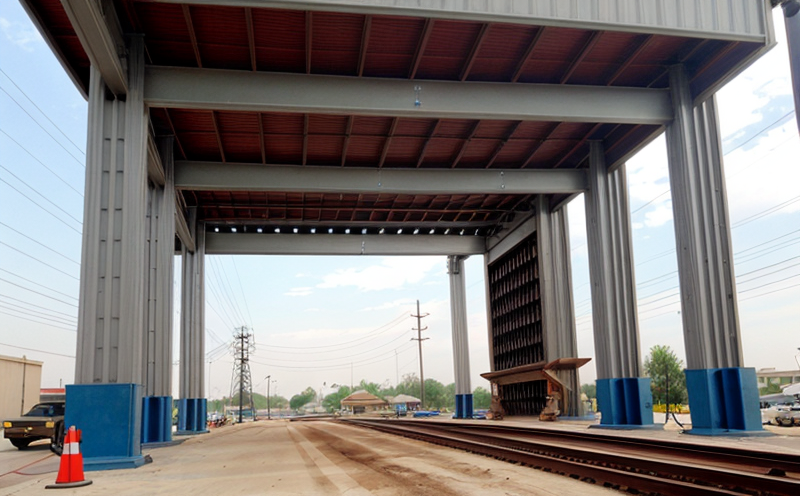ASTM E238 Shear Testing of Structural Materials
The ASTM E238 standard specifies a procedure to determine the shear strength of structural materials under defined conditions. This testing is crucial in aerospace and aviation sectors where the integrity of components is paramount due to their critical role in ensuring safety, performance, and reliability.
Shear testing involves applying a force perpendicular to the surface of a specimen until it fails. The ASTM E238 method ensures that this process adheres to stringent protocols aimed at minimizing variability and maximizing accuracy. This standard is widely recognized for its ability to provide consistent results across different laboratories, making it an indispensable tool in quality assurance and research.
The aerospace industry relies heavily on materials that can withstand extreme conditions such as high temperatures, mechanical stress, and environmental factors. Structural integrity is not just about the material's strength but also how it behaves under shear forces. ASTM E238 provides a robust framework for assessing this behavior, ensuring that components are fit for purpose.
In the context of aerospace and aviation, the results from ASTM E238 testing can influence critical decisions such as design optimization, material selection, and compliance with regulatory standards like FAR 21.497 (Federal Aviation Regulations).
The procedure involves several key steps: specimen preparation, mounting, loading, and data acquisition. Each step is meticulously outlined in the ASTM E238 standard to ensure consistency and repeatability. Specimens are typically cut from larger materials using precise methods to maintain uniformity.
Instrumentation plays a crucial role in this testing method. High-precision universal testing machines (UTMs) equipped with specialized shear fixtures are used to apply controlled loads. Advanced data acquisition systems capture stress-strain relationships, providing detailed insights into the material's behavior under shear forces.
The acceptance criteria for ASTM E238 are based on statistical analysis of multiple test results. Averages and standard deviations are calculated to establish upper and lower bounds that define acceptable performance. Compliance with these criteria ensures that materials meet the stringent demands of aerospace and aviation applications.
In real-world scenarios, this testing is used in various stages of product development and quality assurance. For example, it helps in identifying potential weaknesses in new composite materials or in validating existing designs for airframe structures. The findings from ASTM E238 tests can also influence design iterations to enhance the overall robustness and durability of aerospace components.
Understanding the implications of ASTM E238 testing extends beyond just compliance with standards; it involves a comprehensive approach to material selection, process optimization, and continuous improvement in manufacturing techniques. By leveraging this method, manufacturers and researchers can ensure that their products not only meet but exceed industry expectations, thereby maintaining a competitive edge.
Benefits
- Informed Decision Making: Provides clear insights into material behavior under shear forces, aiding in informed design decisions.
- Consistent Results: Ensures reproducibility across different testing environments and laboratories.
- Regulatory Compliance: Meets the stringent requirements of aerospace standards like FAR 21.497.
- Enhanced Reliability: Identifies potential weaknesses in materials, leading to more reliable products.
ASTM E238 testing is a cornerstone for ensuring that structural materials are capable of withstanding the rigorous demands of aerospace applications. By adhering to this standard, manufacturers can enhance product performance and safety, ultimately contributing to the success of their projects.
Eurolab Advantages
At Eurolab, we pride ourselves on offering comprehensive testing solutions that meet global standards and exceed industry expectations. Our expertise in ASTM E238 shear testing is complemented by state-of-the-art facilities and experienced personnel who are dedicated to delivering precise and reliable results.
- Advanced Equipment: Equipped with the latest universal testing machines (UTMs) for accurate and consistent tests.
- Comprehensive Services: Offering a full range of structural and mechanical testing services tailored to meet your specific needs.
- Experienced Staff: Our team comprises highly skilled professionals who are well-versed in ASTM E238 methodologies and best practices.
- Global Recognition: Our certifications and accreditations ensure that our work meets the highest international standards, including ISO/IEC 17025:2017.
We are committed to providing you with accurate, reliable, and timely results. Whether you require one-off tests or ongoing quality assurance programs, Eurolab is your partner in ensuring top-notch product performance.
Why Choose This Test
- High Precision: ASTM E238 testing ensures that materials meet the stringent requirements of aerospace applications.
- Regulatory Compliance: The test results are essential for compliance with aviation standards like FAR 21.497.
- Rigorous Protocols: The detailed procedures outlined in ASTM E238 minimize variability and ensure consistent results across different testing environments.
- Comprehensive Insights: Provides a deep understanding of material behavior under shear forces, aiding in informed design decisions.
ASTM E238 shear testing is not just about compliance; it's about ensuring that materials perform reliably and safely. By choosing this test, you are investing in the future success of your aerospace products. The confidence and reliability provided by these tests can make a significant difference in the development and manufacturing processes.





